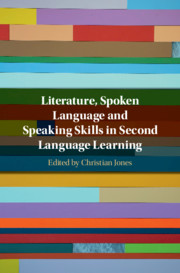Book contents
- Literature, Spoken Language and Speaking Skills in Second Language Learning
- Literature, Spoken Language and Speaking Skills in Second Language Learning
- Copyright page
- Contents
- Figures and Tables
- Contributors
- Foreword
- Acknowledgements
- 1 Introduction
- Part I Literature and Spoken Language
- Part II Literature and Speaking Skills
- 7 EFL Learners Reading and Discussing Poems in English
- 8 An Analysis of Collaborative Dialogue in Literature Circles
- 9 Exploring Literary Texts as a Tool for Developing L2 Oral Proficiency
- 10 Conclusion: Implications for Pedagogy and Research
- Index
- References
8 - An Analysis of Collaborative Dialogue in Literature Circles
from Part II - Literature and Speaking Skills
Published online by Cambridge University Press: 18 October 2019
- Literature, Spoken Language and Speaking Skills in Second Language Learning
- Literature, Spoken Language and Speaking Skills in Second Language Learning
- Copyright page
- Contents
- Figures and Tables
- Contributors
- Foreword
- Acknowledgements
- 1 Introduction
- Part I Literature and Spoken Language
- Part II Literature and Speaking Skills
- 7 EFL Learners Reading and Discussing Poems in English
- 8 An Analysis of Collaborative Dialogue in Literature Circles
- 9 Exploring Literary Texts as a Tool for Developing L2 Oral Proficiency
- 10 Conclusion: Implications for Pedagogy and Research
- Index
- References
Summary
Sociocultural and social cognitive theories have begun to make a lasting imprint on English Language Teaching (ELT) and learning as it is undertaken and understood today across a range of contexts (Steffensen and Kramsch ). This chapter reports on a study conducted with English language learners involved in Literature Circles (LCs) over an extended period and centres on an analysis of the discourse generated within these post-reading, group discussions. The chapter begins by contextualising LCs as a vehicle for reader response and collaborative engagement within an ecological perspective to second language (L2) development. Drawing on sociocultural theory (Lantolf, Thorne and Poehner ) and its application to collaborative engagement in a language learning environment, the discourse presented undergoes an ecologically grounded, dialogical analysis. This analysis interprets examples from the group conversations as affordances for language development identified as an emergent phenomenon, co-constructed and mediated by the support of peers, the shared reading experience and relevant scaffolding. The current study suggests that this dynamic combines collaborative interaction and interpersonal communication with ecosocial processes to promote spoken L2 development, where deep processing of shared interpretation, critical evaluation, collective noticing and expression of affect are externalised within the discussions.
- Type
- Chapter
- Information
- Publisher: Cambridge University PressPrint publication year: 2019
References
- 4
- Cited by

